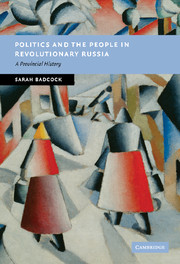Book contents
- Frontmatter
- Contents
- List of figures and table
- Notes on the text
- Acknowledgements
- Maps
- 1 Introduction
- 2 The February revolution: whose story to believe?
- 3 The Socialist Revolutionary Party and the place of party politics
- 4 Choosing local leaders
- 5 Talking to the people and shaping revolution
- 6 Soldiers and their wives
- 7 ‘Water is yours, light is yours, the land is yours, the wood is yours’
- 8 Feeding Russia
- Conclusions
- Bibliography
- Index
- NEW STUDIES IN EUROPEAN HISTORY
2 - The February revolution: whose story to believe?
Published online by Cambridge University Press: 10 August 2009
- Frontmatter
- Contents
- List of figures and table
- Notes on the text
- Acknowledgements
- Maps
- 1 Introduction
- 2 The February revolution: whose story to believe?
- 3 The Socialist Revolutionary Party and the place of party politics
- 4 Choosing local leaders
- 5 Talking to the people and shaping revolution
- 6 Soldiers and their wives
- 7 ‘Water is yours, light is yours, the land is yours, the wood is yours’
- 8 Feeding Russia
- Conclusions
- Bibliography
- Index
- NEW STUDIES IN EUROPEAN HISTORY
Summary
Filled with joyous feelings in this happy moment of my life, I one hundred times cry: Long live the toiling Russian people! Long live an everlasting century of the new way of life they have won! ura! ura! ura!
(Letter from A. A. Ostafev, Gorbatovskii uezd commissar, 12 March 1917)Ostafev's words exemplify the joy with which news of the February revolution was received across provincial Russia. This chapter will tackle the ways in which the political elite sought to control and define understandings of the February revolution. Political power operated on a huge range of levels in 1917. The holding of office, or direct control of political decisions, were tangible indicators of political power. There were, however, other less-obvious forums for the operation of political power. The transmission of revolutionary news gives us our first glimpse of the political elite's anxiety in trying to control the message of revolution. The February revolution is often spoken of as if it were a single event, which was received by and large uniformly, and which had an even ripple of response across Russia. Closer investigation of local conditions, however, reveals that the February revolution in Petrograd initiated a wave of localised revolutions all over Russia, as local populations came to terms with the fall of the old regime, and the establishment of a new order, in a multitude of different ways.
SPREADING THE NEWS
News of the February events in Petrograd was slowly and unevenly disseminated across the Russian empire.
- Type
- Chapter
- Information
- Politics and the People in Revolutionary RussiaA Provincial History, pp. 30 - 55Publisher: Cambridge University PressPrint publication year: 2007



